New report will be presented Tuesday
By Diego Flammini
Assistant Editor, North American Content
Farms.com
The City of Richmond, British Columbia is considering a bylaw that could restrict the size of homes built on the province’s Agricultural Land Reserve (ALR), which covers about 47,000 square kilometres (18,000 sq mi) and covers parts of Richmond, Delta, Surrey and Langley Township.
According to the City of Richmond’s website, the proposed bylaw could limit the maximum floor area to 330 square metres (3,552 square feet) for homes built on land less than eight hectares in area. Homes built on land that’s eight hectares or more could be up to 465 square metres (5,005 square feet).
“A proposed bylaw on house size will send a message to anybody wanting to build a big house on farmland…,” Richmond councillor Harold Steves told The Globe and Mail. “The message we want to get across is we don’t want the big houses on small farms.”
Producers in B.C say the ALR should only be reserved for those who intend to farm.
“(The land) should be used for people that plan on using it for agriculture, not luxury living,” said Rudolph Meier, a dairy farmer from the Fraser Valley.

With respect to luxury living, a Globe and Mail investigation found wealthy investors purchased land within the ALR without any desire to farm.
“We have a (growing population) and are expected to feed that population with less and less land every year,” Meier said.
Tom Hoogendoorn, a dairy farmer and member of the BC Milk Marketing Board, said the homes built on the land should be placed in such a way that still allows for farming.
“Put it (the house) in a corner (of the property),” he said. “There should be a site plan where it’s not going to be in the middle of the land.”
The bylaw will be introduced to councillors on Tuesday, with a public meeting recommended in March.
Since farmland is a precious commodity, Hoogendorn encourages other farmers to speak out if they have concerns.